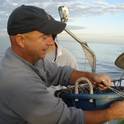The Deep-Pelagic Nekton Dynamics of the Gulf of Mexico (DEEPEND) consortium, funded by the Gulf of Mexico Research Initiative, is a multi-institutional consortium whose objectives include the characterization of biophysical variability in the Northern Gulf of Mexico. Observational and multi-model approaches are used to increase understanding of the dynamics of deep-pelagic (0-1500 m) ocean environments and animal assemblages at multiple temporal and spatial scales. During the second DEEPEND cruise (August 08-20, 2015), Murphy, a University of South Florida Slocum glider loaded with bio-optical-physical instrumentation, was deployed, and on August 15, after 5 days of sampling, it lost communication with its operators. Running in near real time, a 1/25° resolution Hybrid Coordinate Ocean Model (HYCOM), implemented to support DEEPEND research and field campaigns, was utilized to help in the glider’s search. Once the glider lost communications, the model’s real-time forecasts were used in conjunction with a Lagrangian advection scheme to track the possible paths of the glider according to the model’s predicted circulation. During the entire cruise period, the Gulf of Mexico exhibited dynamic Loop Current and mesoscale activity that culminated with a Loop Current intrusion high into the Northern Gulf. The model’s initial forecasts were slightly off and predicted that Murphy would drift in the vigorous Loop Current and into the Atlantic Ocean, but upon assimilating more recent observations, updated model forecasts accurately helped in tracking the predicted location of the glider and ultimately isolated its fate to a small frontal cyclonic eddy in the Eastern Gulf. Fortuitously, the glider eventually surfaced and communicated its position, within this eddy, exactly where the model had predicted its drifted location. Murphy was recovered on August 22, 2015.
Available at: http://works.bepress.com/tracey-sutton/255/
